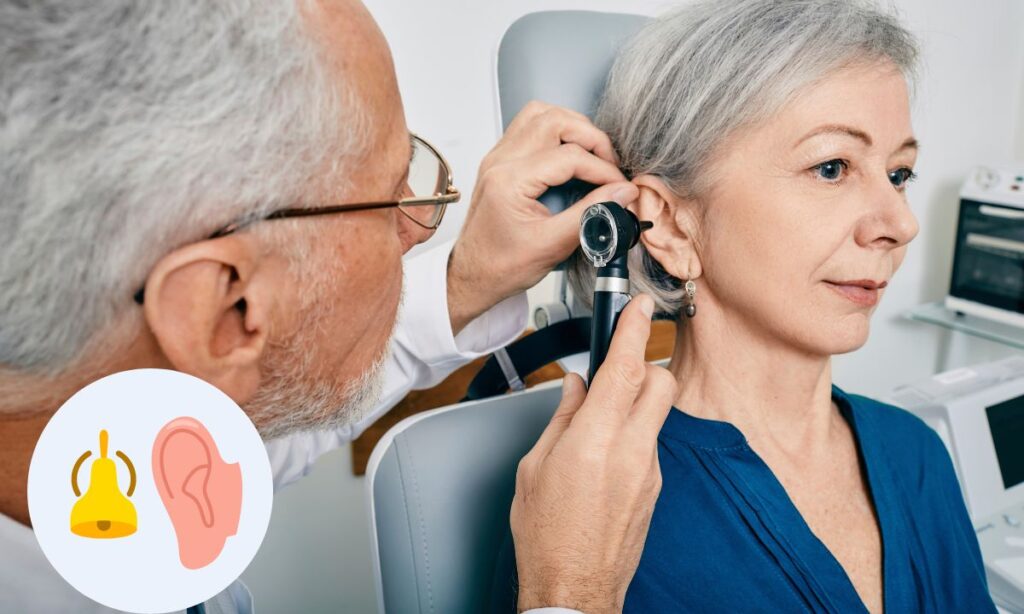Tinnitus is when your ears hear sounds that aren’t really there, like ringing, buzzing, or whooshing. It’s very common and happens to a lot of people. More than 50 million people in the U.S. have it.
Tinnitus itself isn’t a disease, but it can be a sign that something else is wrong with your health.
For most people, tinnitus isn’t dangerous. However, if left untreated, it could point to bigger problems like hearing loss or heart issues.
There are different types of tinnitus. Some people hear a steady ringing or buzzing, while others hear sounds that match their heartbeat, called pulsatile tinnitus. Sometimes, only the person with tinnitus can hear the sounds, but in rare cases, even a doctor can hear them using special tools.
Though there’s no cure for tinnitus, doctors can help manage it, making the symptoms less bothersome. That’s why it’s important to seek help if the ringing doesn’t go away.
Leaving tinnitus untreated can make it harder to enjoy everyday activities and could lead to more serious health concerns.
Is Tinnitus Dangerous?
Tinnitus, by itself, isn’t harmful for most people. It’s more of an annoyance than something that can hurt you.
But in some rare cases, it can be a sign that something else is going on with your body. If you start feeling that the ringing is getting in the way of your daily life or if it comes with other strange symptoms, you should talk to a doctor.
When Can Tinnitus Be Serious?
Sometimes, tinnitus can happen because of a bigger problem that might need treatment.
Here are some situations where tinnitus could be a sign of something more dangerous:
- Head or neck injury: If you’ve hurt your head or neck, it might damage your ears or the nerves that control hearing. This can cause tinnitus and may need medical attention.
- Tumors: A noncancerous growth, like an acoustic neuroma, can develop on the nerve connecting the ear to the brain. This might cause ringing in your ears or even affect your hearing.
- Blood flow problems: If you have high blood pressure or hardening of the arteries, it could mess with the blood flow to your ears. This might cause a rhythmic sound in your ears, like a heartbeat, and could lead to bigger problems like heart issues.
- Chronic illnesses: Conditions like diabetes, thyroid problems, or autoimmune diseases can also lead to tinnitus. It’s important to keep these illnesses under control to avoid more serious health issues.
How Tinnitus Affects Your Daily Life
Even though tinnitus isn’t usually dangerous, it can still be really frustrating. For some people, the constant ringing or buzzing can make it hard to concentrate, sleep, or feel happy. Imagine trying to sleep with a never-ending sound in your ear! This can make people feel tired, anxious, or even depressed. If tinnitus starts to affect your mood, sleep, or focus, it’s a good idea to talk to a healthcare provider.
Other Causes of Tinnitus
There are also less serious reasons why tinnitus might happen:
- Loud noises: Being around loud sounds like concerts or fireworks can make your ears ring. This usually goes away after a while, but if you’re exposed to loud noises a lot, it can cause hearing loss, which often comes with tinnitus.
- Medications: Some medicines, especially in high doses, can cause tinnitus as a side effect. If this happens, talk to your doctor about changing the medicine or lowering the dose.
- Ear infections or earwax buildup: Sometimes, tinnitus can be caused by ear infections or too much earwax blocking your ears. Once the ear is cleared, the ringing usually goes away.
Key Points to Remember
- Tinnitus is usually harmless but can be a sign of something serious if paired with other symptoms.
- Serious causes include head or neck injuries, tumors, blood flow problems, and chronic illnesses.
- Tinnitus can affect your life by making it hard to sleep, focus, or feel calm.
- Less serious causes include loud noises, certain medications, and ear infections or wax.
What Happens if Tinnitus Is Left Untreated?

Tinnitus can be more than just a noise. If you leave it untreated, it can start to mess with how you feel and act. Imagine trying to do your homework, but there’s always a ringing sound in your ear. It can get really frustrating, and over time, it might affect your mood, sleep, and even how you talk to people.
Here’s what might happen if tinnitus isn’t treated:
- Anxiety: The constant noise can make you feel worried, nervous, or stressed. You might feel anxious because you’re not sure if the sound will ever go away.
- Depression: If you feel like you can’t escape the noise, it can start to make you feel really sad or down. This feeling is called depression, and it can make you not want to do the things you usually enjoy.
- Irritability: When the ringing in your ears doesn’t stop, it can make you feel easily annoyed or upset, even about small things.
- Trouble focusing: It’s hard to concentrate on work or even fun activities when there’s always a sound in your ear. The ringing can make it tough to pay attention.
- Difficulty communicating: If the noise is too loud, you might have a hard time hearing what other people are saying, which makes it tricky to talk with friends or family.
How It Affects Your Life
When tinnitus is really bad, it can affect a lot of parts of your life. For example, if the ringing keeps you awake at night, you might feel tired and grumpy during the day. Not sleeping well can make it harder to focus at work and it can even make you feel more stressed.
Tinnitus can also make it hard to concentrate on things like reading or doing puzzles because the sound is always there. Some people with severe tinnitus say it’s hard to focus on conversations or even to relax because the noise never stops. Over time, this can make it harder to stay connected with friends and family.
The American Academy of Audiology says that severe tinnitus can affect people’s mental health, sleep, and relationships. So, it’s important to get help if the ringing is bothering you a lot.
Is Tinnitus Dangerous?
Most of the time, tinnitus isn’t dangerous, but sometimes it can be a sign that something else is going on in your body. For example, if the ringing started after a head or neck injury, it might be a sign that some nerves or parts of your ear were damaged. In rare cases, tinnitus can happen because of a heart problem or other serious health condition. That’s why it’s a good idea to talk to a doctor if the ringing doesn’t go away or if you have other symptoms like dizziness or hearing loss.
Can You Live with Tinnitus?
Yes, many people live with tinnitus and still have a normal life. But if the ringing is really bothering you, it’s important to get help so it doesn’t start affecting your mood or how you feel every day. Doctors can help you manage tinnitus so it doesn’t take over your life.
Can Tinnitus Go Away?
In some cases, tinnitus can go away on its own, but it depends on what’s causing the noise in your ears.
For example, if you have an ear infection, too much earwax, or a jaw problem, fixing those issues might make the ringing stop.
Here are a few situations where tinnitus might go away:
- Changing Medication: Sometimes, medications can cause tinnitus as a side effect. If that’s the case, your doctor might change your medicine, and the ringing could stop.
- Treating an Ear Infection: If your tinnitus is caused by an ear infection, getting rid of the infection might make the ringing go away.
- Removing Earwax: Too much earwax can block your ears and cause tinnitus. Removing the extra wax might stop the noise.
- Fixing Jaw Problems: Sometimes, issues with your jaw can cause tinnitus. Treating these problems could help the ringing go away.
So, in these cases, tinnitus isn’t permanent because once you fix the underlying problem, the ringing might disappear.
When Tinnitus Doesn’t Go Away
Unfortunately, for most people, there is no cure for tinnitus right now. If the ringing in your ears isn’t caused by something that can be fixed, it might not go away completely.
However, this doesn’t mean you have to suffer from it forever. There are treatments that can help make the ringing quieter and make it easier for you to live with.
How Is Tinnitus Treated?
Even though tinnitus can’t always be cured, there are things you can do to make it better. Doctors have come up with different ways to help people deal with tinnitus and reduce how much it bothers them. Let’s look at some of the ways they treat tinnitus:
- Sound Therapy: This treatment uses other sounds to help cover up or mask the tinnitus. For example, you might listen to soft music or nature sounds like ocean waves to drown out the ringing. Sometimes, hearing aids can also help by making other sounds louder, so the tinnitus is less noticeable.
- Behavioral Therapy: Sometimes, the way we think about tinnitus makes it seem worse. Behavioral therapy, like counseling or cognitive behavioral therapy (CBT), helps you change the way you react to the ringing. It teaches you how to deal with the noise without letting it make you too anxious or upset.
- Tinnitus Retraining Therapy (TRT): This is a mix of sound therapy and counseling. It helps retrain your brain to think of tinnitus as just a normal sound that you can ignore. Over time, your brain learns to tune out the ringing, so it doesn’t bother you as much.
- Medications: While there’s no medication that can cure tinnitus, some people take medicine to help with the side effects. If the tinnitus is making it hard for you to sleep or is causing anxiety or depression, doctors might prescribe antidepressants or anti-anxiety medications to help.
Can Tinnitus Be Cured?
Right now, there isn’t a cure for most types of tinnitus. However, scientists are working hard to find new treatments and maybe even a cure one day.
So, while you might not be able to completely get rid of the ringing right now, there’s hope that in the future, there could be better options.
Living with Tinnitus
Even though tinnitus might not go away completely, the good news is that many people learn to live with it. The treatments we talked about can help make the ringing quieter or less bothersome.
Over time, some people get so used to the noise that they don’t notice it as much anymore.
It becomes like the ticking of a clock in the background – something that’s there, but you don’t really pay attention to.
References
Tinnitus (Ringing in Ears): Causes & Treatment (clevelandclinic.org)
Is tinnitus dangerous? Causes, outlook, and seeking help (medicalnewstoday.com)

